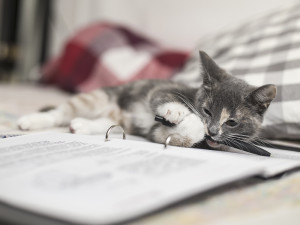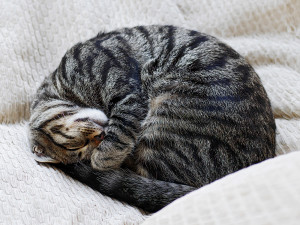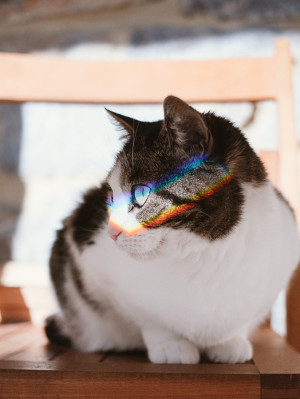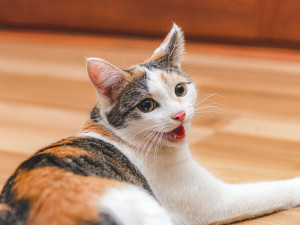What’s All the Cat Chatter About?
Scientists believe they could be mimicking the calls of their prey
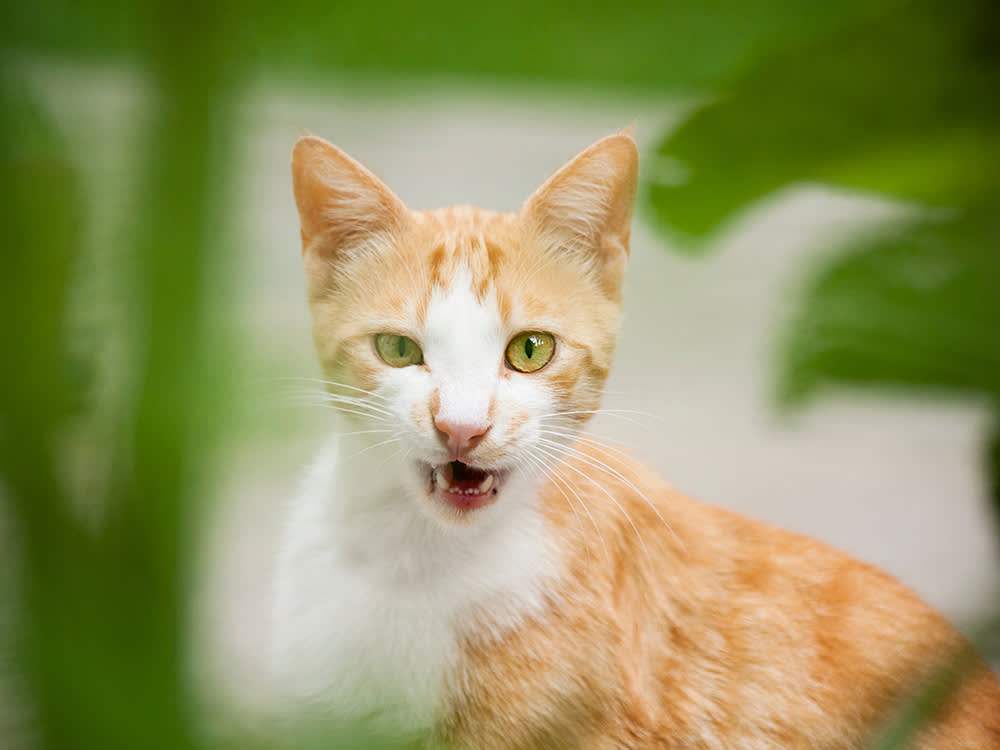
Share Article
If you’ve ever witnessed your cat chattering while looking at something outside, you’ve probably wondered what this odd behaviour is all about. It usually happens like this: the cat is sitting or standing near a window or glass door when they spy a few birds fluttering about or squirrels scampering through the garden. The cat freezes, staring intently at the critters outside, and then, with their mouth held open, the cat’s jaw begins to jitter up and down. It may even look as if they’re cold, like when a human’s teeth chatter. Cats may also chirp (a series of very short meows) while chattering.
This unique feline behaviour, called chattering, chittering or twittering, depending on who you ask, is not totally understood, but it seems to be connected to a cat’s prey drive and hunting instincts. “It has been theorised that cats chatter as a way to mimic the sounds of the animals they’re hunting to confuse them so they are easier to catch,” says Dr Aimee Simpson, medical director of VCA Cat Hospital of Philadelphia in the US. Our cats’ crafty nature continues to shock and amaze.

littleKin™ is Kinship’s home just for puppy and kitten parents. Bop over to check out expert advice, new pet tools, and special deals—all curated for your newest family member.
opens in a new tabAccording to Dr Simpson, scientistsopens in a new tab performing research in the Amazon rainforest in Brazil even witnessed a wildcat called a margay imitating the calls of pied tamarin monkey babies so as to lure the adult tamarins to an area where the cat could attack them more easily. “The anticipation of hunting and the frustration of not being able to reach the intended target are also thought to play a role in chatter.”
Understanding chattering and chirping
Chattering and chirping are different, though cats tend to exhibit both behaviours when they become excited by the sight of birds or other small prey animals. As Dr Simpson explains, chirping is a voluntary vocalisation – a short high-pitched sound – produced when a cat is excited.
On the other hand, “Chatter is a rhythmic stuttering of the jaw with the mouth opened in a tense position.” This voiceless sound is produced without vibration of the vocal folds. Chatter is more likely to be a reflexive behaviour simulating the motion of grasping the prey’s neck in its jaws to kill it. It may also be triggered by a boost of adrenaline caused by the excitement of seeing a prey animal.”
When chattering becomes a problem
Some cats chatter only occasionally and may seem to enjoy the excitement of watching prey animals outside. However, chattering cats might also feel overstimulated, frustrated or anxious, especially if they are frequently teased with prey that they can’t get to. “Even domesticated house cats maintain their hunting instincts,” says Dr Simpson. “Trying to capture an animal that can never be reached can be extremely frustrating to cats. That frustration may lead to anxiety in indoor cats.”
A cat who is feeling overstimulated because they cannot capture the target outside may start doing something called ‘redirected aggression’ (acting out against another pet or human in the household). Left unaddressed, this type of behaviour can snowball and become a larger problem. Always use caution around an overstimulated chattering cat – you don’t want to get hurt if your cat suddenly redirects their predatory instincts towards you.
You can do this by observing your cat’s body language to gauge how they’re feeling. “A cat with its tail and ears up wants to interact with you,” says Dr Simpson. “A cat in a crouched position with its ears flattened against its head is more aroused and should be approached more cautiously.”
If you think your cat is feeling overstimulated or frustrated, Dr Simpson recommends blocking the view of the animals outside (for instance, putting a curtain over the window) and giving your cat toys or puzzle feeders that will allow them to safely and appropriately exercise their predatory behaviour indoors.
Chattering at other times
Cats will sometimes chirp even if there are no tiny critters around to hunt. “Chirping can also be demonstrated by a mother cat trying to get her kittens to follow her or a house cat trying to attract the attention of its human – often to replenish an empty food bowl,” says Dr Simpson.
On rare occasions, chattering can be a sign of a health issue, especially if it happens when the cat is not being stimulated by the sight of birds or squirrels outside. “If a cat is chattering without an obvious stimulus, this could indicate pain from dental disease,” says Dr Simpson. “Cats do not get cavities, but they are prone to tooth resorption, which can destroy the enamel and expose the sensitive dentin below.”
If you notice your cat chattering without any visual stimulus and you also observe signs of dental issues like “bad breath, drooling, dropping food while eating” or lack of appetite, schedule a visit with your vet to have your cat’s mouth checked out.

Jackie Brown
Jackie Brown lives in sunny Orange County, CA, where she works as a freelance writer and editor. When she’s not on deadline, you can find her paddling her outrigger canoe in the Pacific Ocean or hiking in the foothills with her miniature poodle and two young boys.
Related articles
![A cat laying on a binder chewing on a pen.]() opens in a new tab
opens in a new tabWhy Does My Cat Eat Plastic?
If your cat nibbles on pen caps and power cords, they could be bored...
![Curled up tabby cat sleeping on pillows]() opens in a new tab
opens in a new tabHow Many Cat Naps Is Too Many?
A very sleepy kitty isn’t usually a problem, but watch out for these signs of medical distress
- opens in a new tab
Can Cats See Colour?
Short answer: yes – but not the way we do
![kitten lying on the floor breathing through his mouth]() opens in a new tab
opens in a new tabIs My Cat... Panting?
“Cats don’t pant to cool off like dogs do.” Unless your pet is catching their breath after doing the zoomies, Dr Gary Weitzman says panting could be cause for concern
